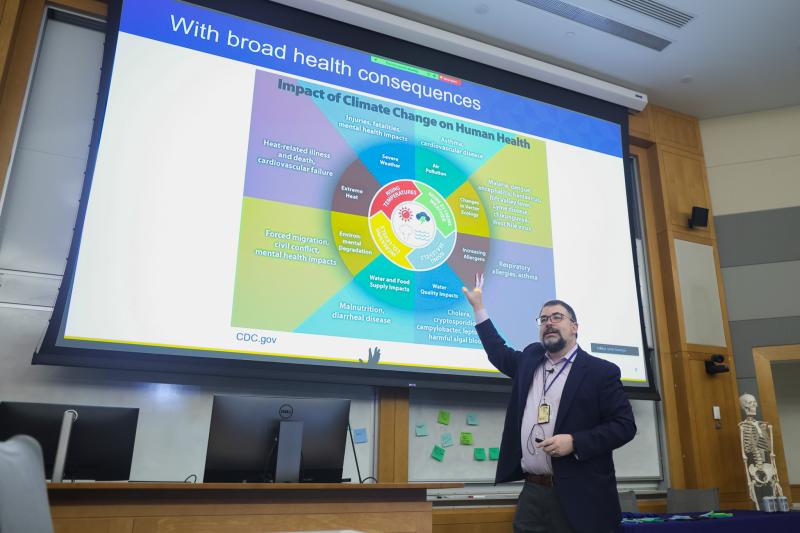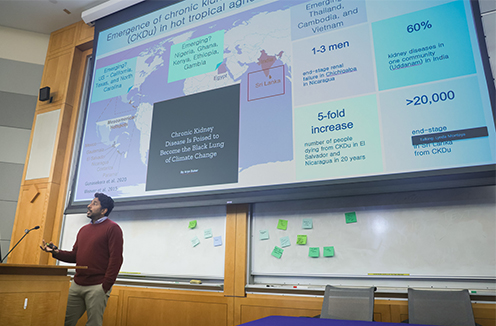
By Kirsten Khire, APR, M.A. and Jane Black
Physicians who practice obstetrics and gynecology have a direct planetary impact every day, according to Duke University School of Medicine faculty Beverly Gray, MD.
“As ob/gyns, we walk into a patient’s room. When we walk out of a room, there is a new person on the planet. We have a responsibility to make sure the planet is a safe place for an infant to thrive and live,” Dr. Gray said.

Dr. Gray opened the Duke Department of Obstetrics and Gynecology’s Climate Action Day on April 23, an event dedicated to addressing the climate crisis as a growing threat to maternal and community health. The day focused on the intersection of climate change and health, especially how extreme heat, pollution, toxins and weather disasters affect pregnancy, fertility and birth outcomes — often exacerbating health disparities in vulnerable populations.
Following Dr. Gray, Robert M. Tighe, MD, shared how climate changes affect health significantly, with a litany of impacts listed by the Centers for Disease Control.Dr. Tighe is leading the development of the Duke School of Medicine’s research strategy on the impact of climate change on health.
“What is the real challenge? The planet continues to warm, at a rate we have never seen before. This is not a natural trend,” Dr. Tighe said. “This is a generational challenge. It’s the kids that will be dealing with those challenges, and those coming into the world every day.”
Tighe said climate change is important because of health impacts “to you as an individual, and also the communities you care about.”
During the event, speakers emphasized key themes including sustainable health system operations, education, global collaboration and research.
Sustainability in the System
How do we ultimately reduce the impacts to the Duke University Health System (DUHS) — a source of carbon dioxide — and how do we reduce the footprint within the health system? Duke’s Climate Commitment is focused on carbon but also on sustainable operations across all areas — waste, water, transportation and food — and the inclusion of DUHS in future climate and sustainability goal planning.

During the event, gynecologic oncologist Leah McNally, MD, MHS, presented “Clinical Updates on Climate Action,” highlighting DUHS efforts to reduce environmental impact and operational costs.
Interactive audience polls highlighted strategies like streamlining surgical trays, transitioning to reusable instruments and gowns, exploring more biodegradable materials and improving energy efficiency.
Educating the Next Generation
As part of Duke’s broader Climate Commitment, the university is offering new educational resources, including a Coursera course “Climate and Health for Healthcare Professions.” These resources aim to equip current and future health professionals to address climate challenges with practical, evidence-based approaches.
Global Connections
Duke’s global health partnerships are increasingly focused on climate-vulnerable regions. Panelists discussed how the university can support and partner with global communities for mutual learning, innovation and resilience-building strategies.
Research to Help Lives
Duke researchers are investigating how climate stress affects health systems and outcomes, disease patterns and health inequities. The Climate Health Research Initiative is driving work in areas like heat physiology, data-driven climate-health solutions, policy development and climate resilience.
Research panelists included:
- Liping Feng, MD, who is studying how heat exposure affects pregnancy using advanced imaging to examine impacts on the placenta and fetus and also how PFAS — known as “forever chemicals” — affect embryo development. Among her research goals: define thresholds of heat exposure that signal risk during pregnancy.
- Nishad Jayasundara, PhD, who described how heat strains the kidneys, leading to acute or chronic disease — especially in areas where chronic kidney disease of unknown origin (CKDu) is emerging. He called for new global heat exposure guidelines, noting current ones fail to protect the most impacted communities.
- R. Keith Reeves, PhD, is researching how climate stressors — like increased pathogen exposure and poor nutrition — interact with the immune system. Vulnerable groups, including pregnant individuals, children, the elderly and the immunocompromised, face the greatest risks.
The Climate Action Day, held during Earth Month at Duke, was organized by the steering committee of the Duke Climate Action Collaborative to Promote Reproductive Health (CACRH) to elevate the impact of climate change on the reproductive health trajectory and create solutions that improve the lives of the women, families and communities.
Related:
DGHI Launching Climate Change and Global Health Initiative Launches May 1